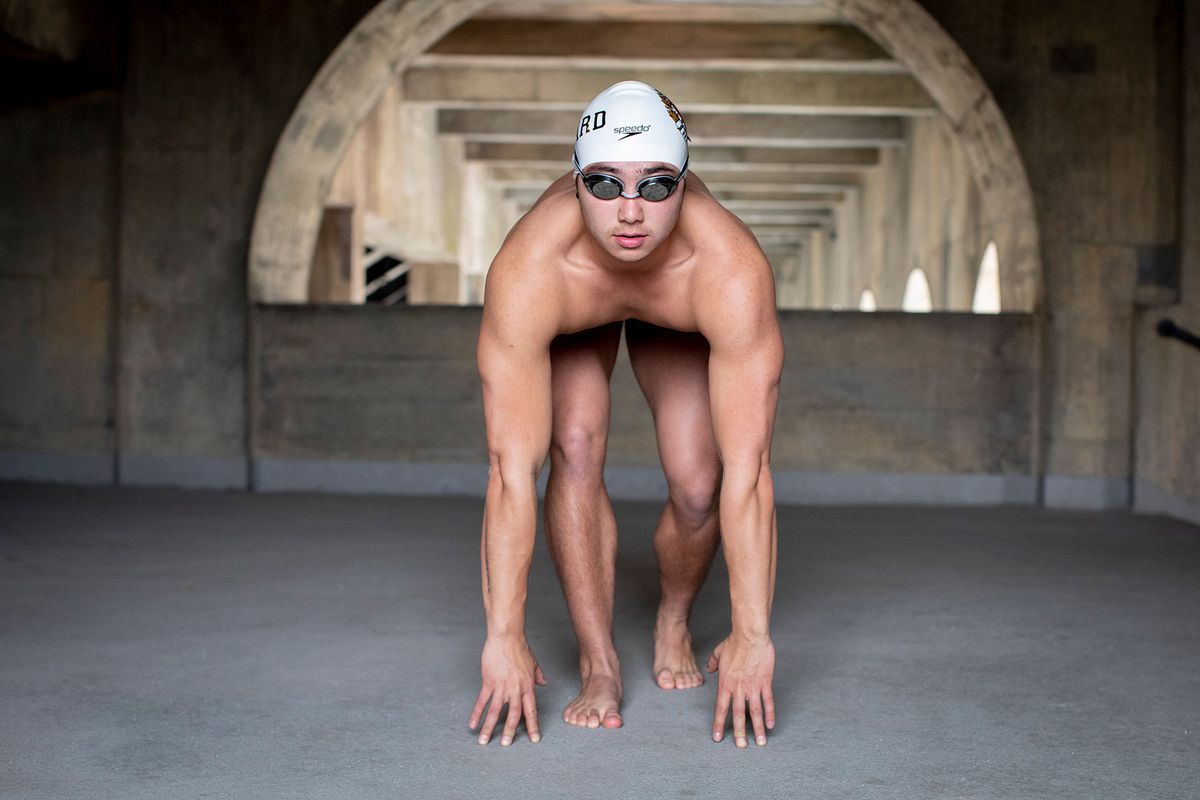Schuyler Bailar, First Trans Man to Compete in Division I, Speaks on Campus
At an event hosted by the Queer Athlete Alliance, Bailar, who swam on Harvard’s men’s team, talked about his upbringing, experience transitioning, and the “trans panic” in sports.

Schuyler Bailar, the first openly transgender athlete to compete on an NCAA Division I men’s team as a swimmer at Harvard, came to campus on Oct. 8 for a talk hosted by the Queer Athletes Alliance and a number of other groups.
Bailar talked about transitioning and coming out to his Korean immigrant family, how his transition impacted his swimming career, and the “trans panic” in sports.
Bailar was introduced by co-presidents of the Queer Athlete Alliance (QAA) Fynlan Nadel ’26 and Alex Zorn ’26. The event was mandatory for a number of varsity teams, including the swim team, and the diversity, equity, and inclusion representatives for each varsity team, resulting in a nearly full Stirn Auditorium. The event marked Bailar’s second time on campus — the first was a small group discussion with the Queer Resource Center in 2017.
Bailar spoke about his experience growing up as a Korean-American assigned female at birth (AFAB) and never really fitting in with the female stereotypes he was expected to follow. As a kid, he wore boys’ clothes and had short hair, and aside from swimming, he skateboarded, played boys baseball, boys soccer, and boys lacrosse, which resulted in a lot of bullying.
“The girls would tell me, ‘Well, you’re not a real girl, so you can’t play with us.’ The boys would say, ‘Well, you’re not a real boy, so you can’t play with us either.’ And so I spent most of my childhood kind of stuck in between … and I started feeling I didn’t belong anywhere,” Bailar said.
Throughout high school, Bailar evolved to be a record-breaking swimmer and was eventually recruited to swim for Harvard’s women’s swim team. However, he suffered a severe back injury in his senior year, and his mental health declined. He made the decision to take a gap year while he fought depression and an eating disorder. It was during this gap year that he moved into a rehab facility for his eating disorder and came out as a transgender man.
This realization, instead of bringing Bailar relief, only terrified him, as he had to decide whether to continue swimming for the Harvard women’s team. Eventually, with support from both the women’s and men’s coaches, he made the decision to swim for the Harvard men’s swim team.
Bailar moved on from his experience to address the controversy that exists in sports around transgender women competing with cisgender women, and transgender men competing with cisgender men. This question of trans women dominating women’s sports has arisen in regards to the transgender female swimmer, Lia Thomas, who was assigned male at birth and swam for the University of Pennsylvania women’s team after transitioning and won the Division I National title for the 500-yard freestyle.
“This myth that trans women are dominating sports, is …a myth because you actually can't name anybody. There is no problem. It is manufactured in order to instill fear so that people can garner power and goals.” Bailar said.
In the Q&A session, Bailar expressed openness to all sorts of questions by saying to ask questions “as if you were a kindergartener.”
Zorn felt the event was a major success: “The audience was captivated by Schuyler’s adaptability and acceptance regarding questions of his transgender experience, making this a collaborative opportunity for any level of knowledge about being transgender,” she later commented.
Heidi Li ’27, who is the DEI representative for the women’s softball team, said that Bailar’s talk and the lessons he taught could be incorporated into Amherst team dynamics.
“I thought one of his most insightful talking points was when talking about teammates who treated him disrespectfully. He silently proved his worth in the pool and although still acknowledging that his teammate’s actions were not okay, he doesn’t hold onto resentment but seeks to forgive him for his own happiness and peace,” she said.
“I think this is a productive mindset to handle conflicts between teammates and it would be beneficial for all teams to hear this talk and reflect on their own dynamics and attitudes towards each other,” she added.





Comments ()